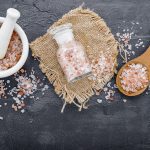Many women use feminine hygiene products as part of their daily routines. Let’s explore their value
From tampons and pads to intimate washes and wipes, the market for feminine hygiene products is endless, with countless options promising to keep women feeling fresh and clean. But with all these choices available, it’s worth asking: are these products really necessary, and is there substance behind the sweet scents?
Quick Read:
- Every woman’s body is unique, and what works for someone else may not work the same for you.
- Please do your research before trying anything new. Don’t stick with a product if it’s causing harmful side-effects!
- It’s easy to be swayed by “natural” or “organic” products – but be sure to read up on the ingredients.
What are feminine hygiene products?
Most women, all over the world, will use sanitary items like tampons and pads for a significant part of their lives. Menstruation is an important life stage and it’s typical to just start using items that are most commonly used by other women around you.
But feminine hygiene products are also other items manufactured to maintain cleanliness, comfort, and health, such as menstrual cups, disposable wash cloths, panty liners, intimate washes, and wipes. These products are meant to help women feel fresh and hygienic during their menstrual cycles and beyond.

The toxic side of feminine hygiene products
Yeast infections. Irritation. Rash. Burning. Unfortunately, these are just some of the unpleasant side-effects that could arise from trying a new scented vaginal wash or a fragranced wipe, or any other item that promises better health yet leaves you worse off.
It’s important to understand that your skin is the only barrier between your body and the external environment. However, the tissue of the vagina and vulva is much more delicate compared to, for example, the skin on your feet. Using scented or fragranced products in such a sensitive area can easily cause harm, making it important to choose products carefully.
The organisation, Women’s Voices for the Earth, has done a lot of work and research into feminine care products, and they’ve found that many of these items can be seriously harmful. This is what they report:
Popular intimate care products often market their wipes, washes, sprays, and more as “must-haves” for both health and self-image. They capitalise on the blatant and absurd underlying message that vaginas are dirty and in need of cleansing. These products may sound refreshing, but they often contain hidden harmful ingredients.
Toxic chemicals
Sanitary pads, tampons, and wipes are typically made with synthetic (artificial) materials. These may contain harmful substances and chemicals, such as dioxins, bleach, or pesticide residues. So, ideally, you don’t really want these ingredients near your skin, especially not in a super sensitive part of your body, where they can cause irritation and other serious side-effects. In fact, according to Women’s Voices for the Earth, feminine douches for example, may include unknown fragrance chemicals and the spermicide octoxynol-9. “Studies link douche use to bacterial vaginosis, pelvic inflammatory disease, cervical cancer, low-birth weight, preterm birth, HIV transmission, sexually transmitted diseases, ectopic pregnancy, chronic yeast infections, and infertility.”
Harsh fragrances
Products with added fragrances or chemicals that are meant to mask odours can cause allergic reactions or irritation, especially for women with sensitive skin or those prone to infections. It’s often better to use fragrance-free options to avoid these risks.
Help at hand
It’s important to understand that you may be risking your overall health with some of these products. You could disturb your pH balance, which can result in issues like thrush, bacterial vaginosis, and in severe cases, chemical burns to the vulva and vagina.
Feminine hygiene products can also trigger infections and chronic dermatitis. Even after the skin heals, it may leave behind scars. Harmful ingredients in these products can impact your skin elasticity and reduce natural vaginal lubrication, causing long-term effects.
What you can do to be proactive about your vaginal health is to schedule your annual check-up and make sure to have your Pap smear. Discuss topics like menstruation, ovulation, and vaginal discharge with your doctor to get a better understanding of how your body functions. Tracking your period can help you identify your natural patterns and any changes.
Remember, it’s completely normal to experience moisture due to the glands in the vaginal area, and seeing a doctor for common concerns like discharge is a healthy choice. Most importantly, be mindful of your body. Please always do your research and get as much information as possible before you try intimate, feminine care products.



















